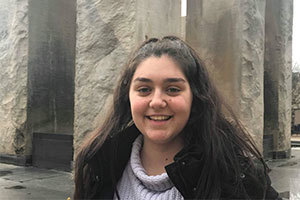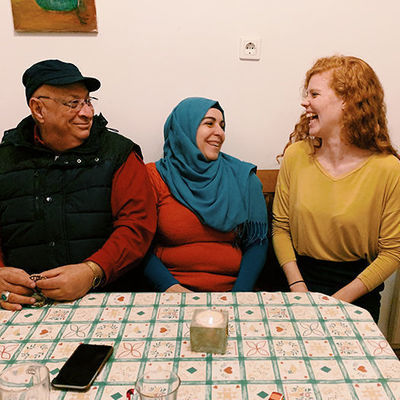
Marinella Stollenwerk Cavallaro '22 hails from Auckland, New Zealand. She visited family in Europe regularly during her childhood. After enrolling at Notre Dame with a major in political science, she decided to declare a European studies minor through the Nanovic Institute for European Studies. This, in addition to her minor in theology.
Cavallaro seizes upon global opportunities that pique her interest and, here, she discusses the courses and experiences that have further internationalized her education through the European studies program at Notre Dame.
How did you learn about the European Studies program at Notre Dame and what led you to join it?
I first learned about the European studies program at Notre Dame when I took the Transnational European Studies Seminar in Washington, D.C. I originally took the class because I thought the idea of [a trip] to D.C. over fall break sounded fun. The class ended up being really interesting. It gave me a great background into international relations between different European nations and the United States. We got to listen to some great presentations from people from the Brookings Institute, and visit different European embassies.
While I was taking this class, I started looking into other European studies classes and the different opportunities the Nanovic Institute offers and decided to declare the minor.
What are some of your favorite European studies classes?
My favourite European studies class that I have taken has probably been the Transnational European Studies Seminar in D.C. Not only did it give me a funded trip to D.C., but it also introduced me to the minor and gave me a great background into European relations as we covered many topics, including climate change and migration.
I also really enjoyed my Cultural Conversations Spanish class. This is a speaking and culture-based class where we watched movies and shows, discussed short stories, and learned about Latin American and Spanish history.
What do you feel is special about the European studies program and why would you encourage others to explore it?
Something special about the European studies program, and a reason I would encourage others to take it, is that it is a very flexible minor. My second philosophy class, Marx, Nietzsche, and Freud, counted towards my European studies minor as we were focusing exclusively on German philosophers in the class. Therefore, I was able to fulfill my philosophy requirement and minor elective in one go.
My Spanish classes have also all counted towards the minor as the European studies minor requires you to achieve competency in a European language. Having knowledge of other languages is really important to me, and I think the emphasis on foreign language is another thing that makes the European studies minor special.
How do you plan to use European studies in your post-grad life?
I definitely want to use my Spanish language skills in whatever I decide to do post-grad, whether that be in a position that requires Spanish or in living abroad. I also think that the analytical skills that I have developed through the European studies minor will be very valuable in post-grad life.
Have you had any grants, study abroad opportunities, or research opportunities through European studies?
Last summer, I got a grant through the Nanovic Institute and Rome Global Gateway to live in Rome and work at a refugee center. Unfortunately, due to COVID, this did not end up happening. However, Nanovic and the Rome Global Gateway did offer virtual internships as a replacement.
I am also currently doing research through the Nanovic Institute. Two other European studies students and I are working under Professor Clemens Sedmak, doing research for his project about the intersection between humanities and policy. I also hope to apply for a research grant in my senior year to help me write my European studies capstone essay.

Learn More
- Explore the European studies minor at Notre Dame.
- Meet Abigail Campbell '20, a European studies student who conducted refugee research in Rome.
- Hear from other undergraduates about opportunities through the Nanovic Institute for European Studies.